














Perhaps one of the most elusive concepts being thrown around today is phronema. OrthodoxWiki defines it as a Greek term that is used in Orthodox theology to refer to “mindset” or “outlook”; it is the Orthodox mind. Attaining this phronema is regarded as the first step toward theosis, the state of glorification. This term is elusive because we have trouble knowing the who, what, when, and where of this Orthodox faith and mindset. Is there a particular century, or era that sets the standard? Yet we find the term used all over social media to accuse others of nonOrthodox or substandard faith, heresy, infidelity, stupidity, and spiritual immaturity. Only the speaker or author has the authentic phronema, by which he judges all others.
So how can we discern true phronema? I think that all could agree that the attainment of phronema is a matter of living the correct faith (orthodoxia) in the correct manner (orthopraxia). After all, it is what we do that best reveals who we are. Even Forest Gump knows that “stupid is, stupid does!” To be in the true Orthodox mindset, one needs to express God’s love and godly love all the time. We need to be doing things in the Orthodox way, which is God’s way. Our phronema needs to express the faith expressed by Christ in the parables of the Kingdom. It must not insist on its own way, be patient and kind, and longsuffering. It must build up the Church community and Christians, instead of being competitive. It cannot be small-minded or punitive, or to seek revenge or to harm others.
I was blessed to be with Metropolitan ANTONIOS of Zahle recently, while he was raising funds for a school and charity in his diocese. While he preached at the liturgy about prayer and love, his diocese was being bombed. The Metropolitan kept his peace and Christian joy as he spoke of love in prayer enveloping all who suffer. He said that when we pray, we join ourselves to God and those
we pray for. We hug them with our and God’s love. The Metropolitan understands the pain and suffering of all the people involved. He showed genuine orthopraxis as he addressed and taught the people before him, setting aside his pain as he addressed our pain, anxiety, and fear. As is the Orthodox way, he had already prayed for his loved ones; now, turning to those who were listening to him, he preached the message Christ prescribed for us. Firstcentury Christians were called “the people of The Way.” Christianity is a way of thinking, living, worshiping, and serving. This is our phronema
We need the witness of our family suffering in the Middle East to help us serve in America. We need their examples of courage and faithfulness to witness to Christ in an Orthodox way on this continent. We need each other more than we ever have before in our American experience, because the world has left the way, and has forgotten God. Modern man is lost and needs to find a way home. In America we have lived under the tyranny of anger and hatred that has led to uncertainty for too many years. Everyone is angry because of fear and insecurity for the future. I am most saddened, however, by how this negativity has infected and affected us, God’s people in the Church. Those of us who get on the Internet and act and sound more like the world than the Kingdom should check to see if they practice the phronema and “the Way” they speak of. The irony of my anger with the anger of our time is not lost on me.
I pray that those who throw around terms like phronema, heresy, and heterodoxy might learn from those who are witnessing to the faith with their lives. The suffering and witness of our brethren call us to live the faith without jealousy and judgement of others. We need the mind of God, not the world. We need to be united to Christ through our prayer, love, and work. We need to transcend the threats that lead to fear and despair. We need God.
The Most Reverend Metropolitan SABA
The Right Reverend Bishop THOMAS
The Right Reverend Bishop ALEXANDER
The Right Reverend Bishop JOHN
The Right Reverend Bishop ANTHONY
The Right Reverend Bishop NICHOLAS
Founded in Arabic as Al Kalimat in 1905 by St. Raphael (Hawaweeny)
Founded in English as The WORD in 1957 by Metropolitan ANTONY (Bashir)
Editor in Chief Bishop JOHN
Assistant Editor Christopher Humphrey
Design Director Walid Awad
Editorial Office: The WORD 2 Lydia’s Path, Westborough, MA 01581-1841 e-mail: WORDMAG@AOL.COM
Subscription Office: 358 Mountain Road PO Box 5238, Englewood, NJ 07631-5238 registrar@antiochian.org
Letters to the editor are welcome and should include the author’s full name and parish. Submissions for “Communities in Action” must be approved by the local pastor. Both may be edited for purposes of clarity and space. All submissions e-mailed and provided as a Microsoft Word text or editable PDF. Please do not embed artwork into the word documents. All art work must be high resolution: at least 300dpi.
ANNUAL SUBSCRIPTION:
U.S.A. and Canada, $40.00 Foreign Countries, $50.00 Single Copies, $3.00 Checks should be made payable to THE ANTIOCHIAN ARCHDIOCESE.
The WORD (USPS626-260) is published in September, November, January, March and May, by the Antiochian Orthodox Christian Archdiocese of North America at 358 Mountain Road, PO Box 5238; periodicals postage paid at Englewood, New Jersey 07631-5238 and at additional mailing offices.
Postmaster send address changes to The WORD, 358 Mountain Road, PO Box 5238, Englewood, NJ 07631-5238 ISSN 0043-7964 www.antiochian.org.
Canada Post Publication Agreement No. 40043404
Return Canada address to American International Mail, STN A – BOX 697, Windsor ON N9A 6N4, Canada

You can help change the life of a child by being a sponsor for as little as $400 a year, just $7.69 per week, $1.10 per day. Donations of any amount are always welcome. Once you sponsor a child, we will send you their name, age, address, and a brief biography. Your child will correspond directly with you, sending you letters and pictures about their life. You will be able to develop a special bond and personal relationship with them.
Executive Director Antiochian Village & CRF Administration 724-238-3677 ext. 402 Childrensrelieffund@gmail.com
You may donate through PayPal on our website: https://antiochian.networkforgood.com/projects/127989-the-children-s-relief-fund
Please make checks payable to Children’s Relief Fund Mail to Antiochian Village Conference Center Attention: Children’s Relief Fund 140 Church Camp Trail, Bolivar, PA 1592
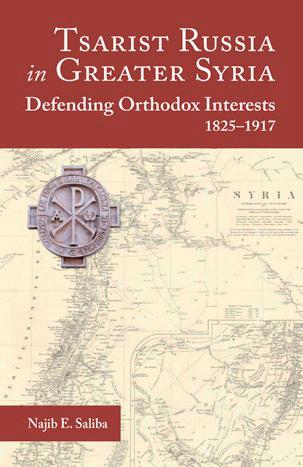


is pleased to invite you to a gathering to celebrate the publication of Professor Najib E. Saliba’s book



Tuesday, November 19th, 6:00 pm–8:00 pm The Diocesan Chancery 2 Lydias Path Westborough, MA 01581
Professor Saliba will be present and offer his perspectives. Light refreshments will be provided.
RSVP by November 8 to Nicholas Chapman htp.nicholas@hts.edu
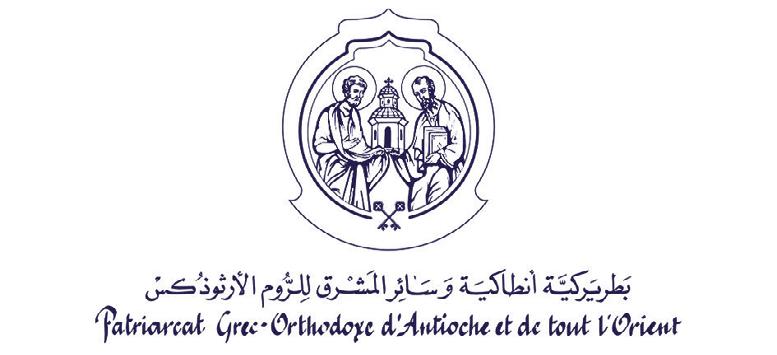
From the Patriarchate of Antioch
Balamand, Lebanon, October 10, 2024
At the invitation of Patriarch JOHN X, Greek Orthodox Patriarch of Antioch and All the East, and in the presence of the Antiochian Metropolitans of the Archdioceses in Lebanon, a meeting of the Orthodox Ministers and Members of Parliament was held to discuss the dire circumstances that Lebanon and the Middle East are going through.
The participants condemned the war waged by Israel against Lebanon and its citizens, accompanied by assassinations, killing of innocent citizens, destruction, forced migration, and displacement. They called on decision-makers in the world to work for stopping the on-going killing that has claimed the lives of thousands of innocent civilians.
The participants called on all Lebanese parliamentarians to immediately elect a President of the Lebanese Republic in accordance with the provisions of the constitution, a president who restores the regularity of the institutional work in this country, which has been suffering for years from a suffocating economic crisis, exacerbated by the current cruel war.
The participants called for an immediate ceasefire, and to work for a just peace, respect the sovereignty and unity of the Lebanese territories, observe and implement the international resolutions by all parties.
The participants appealed to the international community to hasten and stop the massacre of the Lebanese people and to extend a helping hand to the Lebanese government in order to promote stability in the country and provide relief to the afflicted people at the beginning of winter.
The participants showed appreciation for the role of the Lebanese Army in maintaining security and stability, and thanked the security forces for their efforts in these difficult conditions. They also thanked the relief organizations and medical centers for the role they play in alleviating the crisis facing the Lebanese people and called for concerted efforts to embrace the displaced people and provide them with the requirements of a decent life. They emphasized the importance of national unity in this tough time.
The participants launched an appeal to the world to stop fueling the criminality that affects the Lebanese people by drying up the flow of weapons that kill Lebanese citizens.
The participants reiterated their commitment to work towards establishing peace in Lebanon and providing all the requirements for a decent life for its people, who deserve a secure and prosperous life.
Father Roman Braga, a confessor of the faith, was born in Romania in 1922 and fell asleep in the Lord in the United States in 2015. As he was considered by many to be a saint, Romanians continually pray for the official announcement of his canonization. He endured a harrowing, eleven-year imprisonment in communist Romania, enduring severe physical and psychological torment. Even after his release, he continued to suffer moral persecution until his departure for Brazil in 1968. Patriarch JUSTINIAN facilitated Father Braga’s departure in order to save him from further harm from law enforcement because of his active involvement in his parish.
Father Braga, released as a deacon, struggled to find employment in various dioceses to make ends meet. Despite facing rejection from some bishops, he harbored no resentment, nor did he hold a grudge against them. Rather, he recognized their fear of persecution that the Church was suffering at the time.

We come to know him more intimately through his book, Exploring the Inner Universe: Joy – The Secret of Life, which is the product of an extensive interview with him. In this book, he delves into various aspects of his life, the history of the contemporary Orthodox Church in Romania, the spirituality of the Orthodox Church and its people, and many other topics.
I was particularly struck by the purity and clarity of his spirit in some of his responses to the interviewer’s questions. The interviewer, also Romanian, posed a lengthy question spanning several pages, criticizing the bishops who compromised with the communist authorities and remained silent about the brutal persecution of Christians in prisons and detention camps solely on account of their faith and zeal for the Church. At that time, the authorities fiercely opposed any grassroots pastoral work, keeping some churches open and allowing high-level theological publications that the general populace did not understand and which thus posed no threat. This facade served to show the world that the Church was alive, while concealing the reality of persecution.
In his critique of the bishops, the journalist indirectly suggests that the grace of God has left the “open” churches and moved to the prisons, where believers endure daily horrors. Father Roman responds:
I never believed that the Spirit moved from the Romanian Church into the prisons, as you seem to imply in your question. When we were in prison, we would pray that the hierarchs of the Church would stay where they were and not come to us, because the Spirit is where the Holy Sacraments are, where the Holy Liturgy takes place, and where the Hours, Vespers, and Matins are read. The Holy Spirit is the life of the Church. Only if we are truly members of the Church, members of the Holy Body of Christ, we are nourished only by the Holy
Spirit. The Church cannot exist without its clerical hierarchs. The Church is comprised of the hierarchy, the clergy, and the people. As you cannot mistake the Church for the fault of some individuals, you cannot confuse it for some hierarchs. It is true that the hierarchs made compromises, but they worked to maintain and continuously offer the Holy Sacraments. And the Church could not exist without them. We know this also from the Holy Fathers. You cannot have the Church comprised only of people and no hierarchs (p. 101).
He continues:
I believe that the Church, at least in Romania and Russia, was strengthened during the Communist persecution. I dare to say that suffering compels individuals to mature, but also the Church. Nikolai Berdyaev, a Christian philosopher, in one of his books, affirms that the Church was strong during the first 300 years of persecution. Later, when Constantine the Great gave freedom to the Christians, the spiritual life of the Church became diluted; the Church was more of an institution than a spiritual reality.
The same thing happened during Communism: the Church was obligated to limit all her activities to inside the four walls of the temple. I do not know the situation in other countries, but the Romanian Church today launched a campaign of physical and spiritual reconstruction. Priests are now serving in schools, hospitals, and the army. I’m optimistic; I think that the Romanian Church will contribute in renewing Orthodoxy in the soul of the Romanian nation (p. 102).
In his answer to the question about the Church’s historical state, which witnessed heretical patriarchs and bishops who indulged in their desires, Father Roman says:
To tell you the truth, I am not comfortable with the idea that, if the hierarchs are sinful, then the Church no longer exists. Nor am I comfortable with the idea of what is called spiritual elitism. All bishops, without exception, must be free from suspicion and lead exemplary lives. But their failure to do so does not negate the existence of the Church. I do not dare say that if a bishop is personally sinful, the Spirit of God no longer works in him, because the Holy Spirit always works for the salvation of all people, regardless of the worthiness of those who officiate at the Holy Sacraments. The Holy Spirit uses one hierarch today and tomorrow another, but the Church remains the same. Many priests are not worthy, but the Holy Spirit does not come and go in relation to our worthiness or unworthiness. The Holy Spirit is the life of the Church, even if some of the members of the Church are sick or wounded by sin (pp. 101–102).
When the journalist challenged his assertion that bishops’ virtuous lives are insignificant to the Church’s continuity, he replied, “I never implied that.” He noted that countless holy bishops existed and convened ecumenical councils even during periods of widespread episcopal heresy. Nevertheless, the Church persisted, and the Holy Spirit remained active despite numerous crises.
Father Roman then cited the faithful who filled the churches even amidst severe persecution, emphasizing the significance of their ongoing spiritual nourishment through the Church’s sacraments. This, in his view, preserved the Church.
The faithful Orthodox people were wise in those days and did not leave the Church. The churches under persecution were more crowded with believers than in the so-called free period, that is, when we began to enjoy freedom and democracy during the Constantinian era and our bishops no longer bargained with the authorities. When we were in prisons, we prayed for our hierarchs. We used to pray for the hierarchs, hoping they would do something to keep the churches open (pp. 103–104).
He cited Saint Gennadius II, Patriarch of Constantinople, who signed an agreement with the Ottoman Sultan after the fall of Constantinople to the Turks, stipulating that Christian services be limited to the remaining churches. He quoted the saintly patriarch: “It is time to sacrifice the forms in order to keep the essence.”
May God have mercy on us and infuse our souls with His grace, for as He tells us, “Where sin increased, grace abounded all the more.”
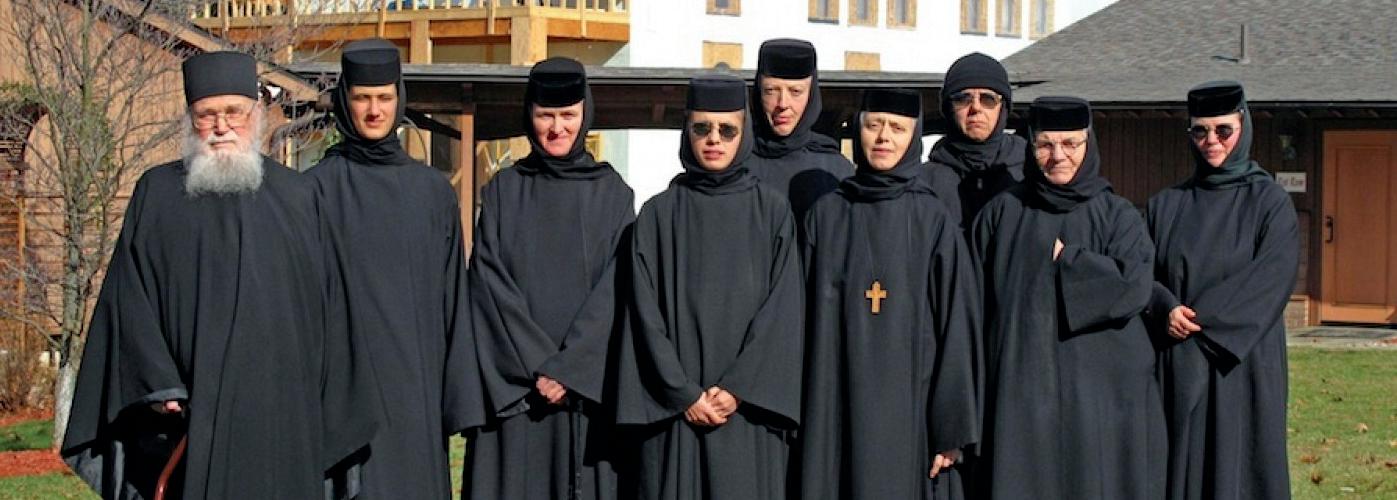
These are important questions. Prayer is a way to connect with God and with others as well. There are two kinds of prayer: individual and communal. Through prayer, we acquire from God power and consolation.
The human being is weak, and needs the strength and consolation of his Creator. Acquiring this divine strength and power through prayer is a way to help one’s neighbor. The praying man or woman is an imitator of the angels. The angel through its constant prayer acquires power and light from God. It uses this power for the evangelization and ministry of others. It cannot take the place of the Savior, but as an intercessor it assists God in the salvation of others, guiding them on the path of salvation. Each human being acquires this strength through his or her fervent prayers, through his or her nightly vigils. Thus, he or she earns great consolation that makes one’s soul and the souls of others rejoice.
“Lord, teach us to pray… So He said to them, ‘When you pray, say: Our Father in heaven … do not lead us into temptation, but deliver us from the evil one” (Luke 11:1). “Watch and pray, lest you enter into temptation” (Mark 14:38). Prayer leads each person, once again, to God. Hence, the grace of
God pours into his or her heart, rendering him or her strong in the power of God. The devil is not chased easily, for, as the Bible says, he is “a strong man” (Mark 3:27).

“Rejoice always, pray without ceasing, in everything give thanks” (1 Thessalonians 5:17). St. Isaac the Syrian says: “Struggle to acquire the experience of prayer and you will acquire all virtues.” Prayer pushes us to participate in the pain and struggle of others. Look at the angels: they are “sent forth to minister for those who will inherit salvation” (Hebrews 1:14). It is a very fast way of communication, faster than the speed of light. Prayer aims at restoring peace to a world of conflict. This is why many ask the priests to pray for them.
Prayer is a personal experience for the soul of each human being. It is also a foretaste of the Kingdom. Prayer is more advantageous than sleep! It is a foretaste of God’s abounding love. Prayer is more than just intercession: it is an apostolic mission. Hence, intercessory prayer is a continuous, quiet, open, reverberating personal experience, that illuminates us and others. It calls for the love of God and mercy to descend upon all. This is our responsibility, and it is not limited to the priest. The misery of the world propels us to pray fervently to attract God’s mercy. This is our great responsibility. The miserable, suffering world awaits daily our prayer because it longs for the mercy of God. The world needs us, needs our prayer, our intercession, or our communication with God through prayer and supplication, because it longs for God’s mercy.
This is why we constantly repeat in our prayers: “Lord have mercy.” Despite our weaknesses and sins, we have to transmit through prayer our love and the love of God that is within us. Again, intercessory prayer is an apostolic work.
The process of prayer becomes a resurrectional process, a process of rising from death and sin, this is why the Bible says: “This kind can come out by nothing but prayer and fasting” (Mark 9:29). The devil works in the world. Through our prayer, we participate in the safeguarding of the world’s equilibrium. This is why it is not enough for us to pray for ourselves; we should pray for the whole world as well, just as the Theotokos did. This is why St. John of the Ladder says: “The prayerful man/ monk abandons the world in order to unite himself to everyone” through his prayer.
Man cannot accomplish anything without divine Grace. St. Paul exhorts us, saying that “supplications, prayers, intercessions, and giving of thanks [should] be made for all men” (1 Timothy 2:1). Spiritual life has prayer as its basis. The contemporary elder, St. Joseph the Hesychast, says, “If someone asks you for spiritual guidance, exhort him to pray before anything else, as prayer will teach him the rest and sanctify him.” At the beginning of spiritual life, prayer is exhausting, as one forces himself or herself to pray. With practice, however, prayer becomes spontaneous. Then, the Holy Spirit gives one a strong desire for prayer, and it is no longer man who prays, but the divine Spirit who prays through him. As the Holy Spirit continues His work, prayer becomes continuous, day and night, while man works or rests. Thus, man fulfills St. Paul’s commandment to “pray without ceasing and in everything give thanks” (1 Thessalonians 5:17).
The practice of the Jesus prayer, “Lord Jesus Christ, Son of God, have mercy on me, a sinner,” presupposes humility and almsgiving, confession and love of one’s neighbor. The goal, according to St. Seraphim of Sarov, is to acquire the Holy Spirit. As
St. John of the Ladder explains: “The beginning of prayer is like rowing a boat so that it begins to sail. At the end, one no longer needs to row, but only to spread the sails leaving the boat to be moved by the wind of the Holy Spirit.”
Last but not least, there is a difference between the Jesus prayer and the prayer of the heart. As St. Macarius of Egypt says in his nineteenth homily:
It is, however, necessary at first for one coming to the Lord to force himself thus to do good, to love, to humble himself … even if he should not in his heart be so inclined …. Let him push himself to prayer even when he does not possess the prayer of the Spirit. And so, God, seeing him striving so and pushing himself by
determination even if the heart is unwilling, gives him the authentic prayer of the Spirit, gives him true charity, true meekness, ‘the bowels of mercies’ (Colossians 3:12), true kindness, and, simply put, fills him with the fruits of the Spirit.
Prayer is man’s fellowship with God. As the famous proverb says: “Tell me who your friends are, I will tell you who you are.” Prayer unites man with God and with others. Prayer is a mirror that clarifies one’s state. The man who truly prays stands before God as if it were the Last Judgment anticipates that day. Jesus calls out to us: “Come to Me, all you who labor and are heavy laden, and I will give you rest.

Take My yoke upon you and learn from Me, for I am gentle and lowly in heart, and you will find rest for your souls. For My yoke is easy and My burden is light” (Matthew 11:28–30).
Yes, the yoke of prayer is difficult at first. This is why when man starts coming near to the Lord, he must force himself to pray, even if his heart was unwilling. When God sees his struggle, despite the unwillingness of the heart, He will give him pure prayer. This is what St. Macarius of Egypt also says in his nineteenth homily, and he further adds: “Man must push himself to love, even if he does not have love …. He must push himself to do good …. God, seeing him striving, will give him true charity, true meekness, true kindness. Simply put, God will fill him with the fruits of the Spirit.”
Fervent prayer impels the praying man to serve others. Look at the angels, who are “ministering spirits sent forth to minister for those who will inherit salvation” (Hebrews 1:14).
Through prayer, the individual enters into communion with God and with others. Prayer can restore the unity of opposites. One goes out of himself, out of his loneliness, boredom, and nothingness. He acquires peace and quietness, and he becomes discerning and vigilant in his thoughts. Prayer propels us to participate in the struggles and joys of others. This is what we call the universality of prayer. Long is the discussion on prayer and its effectiveness. All of this is part of the practical life. True prayer or pure prayer leads us to theoria and the illumination of the mind. It is the perfection of the grace of God that makes our mind the mind of Christ (1 Corinthians 2:15, Philippians 2:5).
This is not merely theoretical, logical thinking, or a way of piety, but is the fruit of a lived experience in hearts purified of passions. It is a truth that is not knowable except through the uncreated energies of God. If humanity’s prayer ceases, then the end of the earthly life will come because of the aggregation of evil. Then, “there should be delay no longer” (Revelation 10:6).
Prayer, in the end, is an expression of our yearning for God and for our neighbor, of our love for God and for others. It is difficult because it is free, and does not seek material rewards. It is a way of communication, a communication faster than the speed of light, better than all modern ways of communication. It consists of both hearing and vision. This is all to restore peace to a world continuously in conflict. This is why many ask the priests to pray for them. THROUGH PRAYER,

“Oh, taste and see that the Lord is good!” (Psalm 34:8)
YHWH (the Lord) matōwq – He is sweet as honey, aromatic, enlivening, satiating. The thrills of the world become dull and repulsive when compared to a glimpse of God. So why does everything fake and cheap draw us away? Why are we distracted and prefer mud over divinity? What can be done so that we might long for God with fervor and fierceness?
Why was Eve so enticed by the tree’s fruit? Imagine the delights in her life – the wonder of Paradise! Swept up in a vision, St. Efrem describes Eden’s splendors: “The intellect grew dizzy and weak and the senses could not contain its treasures . . . . Feeble eyes cannot gaze upon the dazzling sight . . . . Paradise surrounds the limbs with its many delights; the eyes, with its handiwork, the hearing with its
sounds, the mouth and nostrils with its tastes and scents.” All this was given to Eve. She had it all, yet she lusted after the forbidden fruit. Even in Paradise, Eve forgot God. How?
The soul grows distracted. Our Lord once shared this parable: “A man once gave a great banquet and invited many. And at the time for the banquet he sent his servant to say to those who had been invited, ‘Come, for everything is now ready.’ But they all alike began to make excuses” (Luke 14:16–18).
We read, ἀπὸ μιᾶς – “with one voice” – πάντες παραιτεῖσθαι – “they excused themselves.” The Greek paraiteomai comes from two words. Aitéo means to ask or pray; pará implies aversion, repudiation, and even distancing. With one voice, the world says to God, “Please, leave me alone.” God offers Paradise. The soul responds, “No thank you. Cut me off.”
This is a marvel! Just think of the excuses we make, one after the other. One hidden thought, “Not now God,’ follows another thought, “Please leave me alone.” We become desensitized by these excuses, and they become a way of life.
Here are the excuses of the men in the parable:
“ The first said to him, ‘I have bought a piece of land, and I must go out and see it; please accept my apologies.’ Another said, ‘I have bought five yoke of oxen, and I am going to try them out; please accept my apologies.’ Another said, ‘I have just been married, and therefore I cannot come’” (Luke 14:18–20).
What fine excuses, right? People are busy. The first man has a career in which he has invested a lot of time and study. It comes with debts and expectations. America is a career-driven society. We have responsibilities, ambitions, obligations, so we relate all too well. The second man has just bought ten oxen.
These were not John Deere tractors. You could not park them in the garage and walk away. They required food, water, and daily care. It would be unreasonable to leave them. The third fellow was newly married. Even better. He was smitten, devoted, and in-love. Who could ask any more from him?
The excuses we offer God are brilliant. But they fall short. What is actually happening in our heart when we make excuses? How is the soul enticed away from God, and how can we return?
St. Diadochos of Photiki wondered about Eve and her excuses. This fifth-century mystic contemplated our fall from grace, reflecting on that first dialogue between our mother and the snake. How did she become so hoodwinked? “Eve is the first to teach us,” he says, “that sight, taste and the other senses, when used without moderation, distract the heart from its remembrance of God.”
The senses so easily make us stupid. Sight, taste, touch, smell – when pampered – put us to sleep. One look too much, one gluttonous bite, one lustful indulgence . . . . “So long as Eve did not look with longing at the forbidden tree, she was able to keep God’s commandment carefully in mind; she was still covered by the wings of divine love and thus was ignorant of her own nakedness. But after she had looked at the tree with longing, touched it with ardent desire and then tasted its fruit with active sensuality, she at once felt drawn to physical intercourse and, being naked, she gave way to her passion.”
The saint goes on: “It is in no way contrary to the principles of true knowledge to eat and drink from all that is set before you, giving thanks to God; for ‘everything is very good’ [cf. Genesis 1:31]. But gladly to abstain from eating too pleasurably or too much shows greater discrimination and understanding.”
God wants us to enjoy life. He wants us to savor food, to relax to a good beat, to delight in beauty. But when we indulge ourselves, when we lose self-control, when we give in to burning craving, everything starts to fall apart. We stop enjoying God’s gifts. We become addicted to them, glued to them, and adulterous. We become slaves to our senses, enslaved to our bellies, and enslaved to our eyes’ burning lust.
Most people have heard of Sigmund Freud. Fewer know about Edward Bernays, Freud’s nephew. Bernays was brilliant. He was a pioneer in corporate propaganda. He could sell anything. He won renown with his campaign to promote smoking. Cigarettes were taboo for women. Bernays fixed that. He rebranded them: “Freedom Torches.” He made the cigarette a symbol of independence. It took on like fire, and the cigarette industry boomed. Bernays made motorcars erotic. He persuaded the masses that they needed Procter & Gamble soap. He taught Americans not just what they should buy, but what should want. To quote one social commentator: “By satisfying the inner irrational desires that his uncle [Freud] had identified, people could be made happy and thus docile. It was the start of the all-consuming self which has come to dominate today’s world” (Adam Curtis). Edward Bernays’ accomplishments were not unique. He was a pioneer among many. They built a world of consumerism. They created the “Century of the Self.” Welcome to the 21st-century world.
We have come a long way since that first lustful glance by Eve. One forbidden fruit is not enough. We are swimming in forbidden fruits, noise, lusts – the distractions of the world. That’s the problem. Where do we go from here? “Let us not be like others, who are asleep, but let us be awake” (1 Thess. 5:6).
St. Diadochos goes on to give us hope: “We shall not gladly detach ourselves from the pleasures of this
life unless we have fully and consciously tasted the sweetness of God.” The soul needs to be occupied with God. The soul needs to taste God, to savor God, and to cherish God. “Give it nothing but the prayer, ‘Lord Jesus’ . . . Let the intellect continually concentrate on these words within its inner shrine with intensity . . . . Meditate unceasingly upon this glorious and holy name in the depths of the heart . . . . When the mind is closely concentrated upon this name, then we grow fully conscious that the name is burning up all the filth which covers the surface of the soul; for it is written: ‘Our God is a consuming fire’ (Deut. 4:24). Then the Lord awakens in the soul a great love for His glory.”
“ Taste and see the sweetness of God” (Psalm 34:8). “Your love is better than wine; your anointing oils are fragrant” (Song of Songs 1:2–3). “One thing have I asked of the Lord, that will I seek after: that I may dwell in the house of the Lord all the days of my life, to gaze upon the beauty of the Lord” (Psalm 27:4).
There are many distractions, but only one God. There are a lot of thrills; only one Lord. Drowning in our fears, obsessions, and excuses, we can remember this: God alone satisfies. Meditate on His name.
Christopher Holwey
Over a year ago, after listening to a podcast by Fr. Thomas Hopko on Ancient Faith Radio about the difference between Hades and hell, I started realizing that some of the translations we have in our Apolytikia and hymns of the Church (Antiochian) were wrong. We’ve been singing that Jesus released us from hell; or that He called Lazarus forth from the nethermost hell; or that He destroyed hell with His godly power. Using the word hell in these cases is incorrect. The word in Greek is actually Hades, ᾍδης, as it is in Arabic, مِيحجَلا . Hades and hell are not the same thing.
We often interchange these words, and I see it even in some translations of the Bible, but it is incorrect to do so. Doing a search in the Hebrew Old Testament on the word hell, I discovered that all throughout the Psalms, Proverbs and Prophets in the New King James Version (NKJV), when it says “hell,” the word is actually Sheol (and each one of those instances, by the way, has an explanatory footnote). The Revised Standard Version (RSV) though, has it correctly translated as Sheol. The word for hell is found first in Matthew 5, where Jesus is explaining the commandment “You shall not murder.” “But I say to you that whoever is angry with his brother without a cause shall be in danger of the judgment. And whoever says to his brother, ‘Raca!’ shall be in danger of the council. But whoever says, ‘You fool!’ shall be in danger of hell fire.” The word for hell in Greek is Gehenna (γέενναν), which may refer to the “Valley of the Son of Hinnom” from 2 Chronicles 28:3 and Jeremiah 39:35, a place outside of Jerusalem, where forbidden pagan religious practices were held, and

children were offered as a sacrifice to Molech. The burning there of trash and such never ceased, and according to the Orthodox Study Bible, Gehenna then acquired the connotation of eternal punishment in the afterlife, like this smoldering garbage dump in the Valley of Hinnom. This eternal hell then, or “hell fire,” would not be associated with the place where people went after they died, but rather to their state of affairs in the afterlife, as spoken of in Revelation 14:9ff. There they are “tormented with fire and brimstone … and the smoke of their torment ascends forever and ever.” There the devil, the beast, and his false prophet would be sent in the end, to the lake of fire (Rev. 19:20). As it says in 2 Peter 2:4, the angels who sinned were cast down to hell, which in Greek is the word Tartarus, ταρταρώσας, that is, not hell itself, but rather a place where sinners await judgment.
In fact, if we want to understand the true nature of the afterlife, heaven and hell are not places to which we go, depending on our righteousness or wickedness. God is everywhere present and fills all things, and as we read in Psalm 138/139:7ff. If we go to heaven, or to Hades/Sheol, or to the uttermost parts of the sea, He is there. We cannot escape His presence. So, when the sea, Death and Hades give up the dead in them (Rev. 20:13ff), and Death and Hades are thrown into the lake of fire, our Orthodox understanding is that this fire is the fire of God’s divinity: His holy, divine, lifegiving and eternal presence. When we look at the Greek words for “fire and brimstone,” it surprised me to see that the word for brimstone is theion, which comes from the word theios, θεῖος.” Although it may be translated as brimstone or sulfur, it may also be translated as divinity or godhead (Strong’s Concordance, 2304), lending itself to the understanding that this fire and brimstone is really the divine fire of God’s holy presence. Therefore, in the end, God will simply
surround us all with Himself, His holy divine fire of His unconditional eternal Love. If we rejoice in that fire, it will be heaven to us. If we have rejected God and His Word, His will and His presence, then it will be an eternal hell. This is not God punishing us in any way, shape or form, however. It is His Divine Love that will surround us all for all eternity.
On the other hand, the word Hades, or Sheol, simply refers to the realm of the dead, where people went after they died, before the final judgment. Jesus even explains this in the Parable of the Rich Man and Lazarus, in Luke 16:19ff. Here He says that the rich man died and was buried. “And being in torments in Hades, he lifted up his eyes and saw Abraham afar off, and Lazarus in his bosom.” Hades is simply the realm of the dead, and it may even have had various levels of awareness. The rich man knew that he was in torment in the flame, but Lazarus was in the bosom of Abraham. There still is a flame and fire in Hades, for those who were “close-handed, and unready for mercy” (St. Cyril of Alexandria), but it was not the eternal and final lake of fire (the divine fire of God’s love) from which the merciless and unrepentant could not escape. This is quite obvious when you think about it in terms of Jesus and His death on the Cross. Let me explain this difference further through the hymns that I claim are incorrectly translated.
In our Tone 2 Apolytikion of the Resurrection, we have been singing: “When Thou didst submit Thyself unto death, O Thou deathless and Immortal One, then Thou didst destroy hell with Thy godly power....” In the Evlogetaria we sing every Sunday, it says: “The company of the angels was amazed when they beheld Thee numbered among the dead, yet Thyself, O Savior, destroying the power of death, and with Thee raising up Adam and releasing all men from hell.”
Both of these incorrectly use the word hell, when it should be Hades. When Jesus died, He did not go to hell, obviously! He did not destroy hell, since in the end hell will not be destroyed (remember, it iss God’s Love surrounding us all), nor did He release any men from hell, because that’s not where people went when they died before His Resurrection, before the final judgment. When Jesus died, He went to Hades, to the realm of the dead, like everyone else, and He destroyed Hades and its power; He destroyed the power of death; and He released all men from that realm of the dead, which is Hades.
Psalm 16:9–10 says: “For You will not leave my soul in Sheol, nor will you allow Your Holy One to see corruption.” Sheol is where Jesus went when He died, the Hebrew version of the Greek Hades. This is even quoted in Acts 2:25–28, where St. Peter speaks about how Jesus fulfilled this Psalm, as the Holy One Who would not see corruption nor be left in Hades.
In the Canon of St. Lazarus that we pray on the Friday night before Lazarus Saturday, it now correctly says: “Thou, calling to Lazarus, brakest in pieces the bolts of dark Hades ...” “Hades’ vaults shook and quaked.” “To Thee doth Lazarus cry: O Destroyer of Hades, Thou hast now called me to Thee from nethermost Hades and when I was dead hast Thou raised me at Thy bidding.” It is from Hades, the realm of the dead, that Jesus called Lazarus forth, as Hades begins lamenting with bitter groans.
One of the prayers that the priest says in the Divine Liturgy is: “In the grave with the body, but in Hades with the soul as God, in Paradise with the thief, and on the throne with Father and the Spirit, wast thou, O Christ, filling all things, thyself uncircumscribed.”
The Kontakion of Pascha says: “Though thou, O deathless One, didst descend into the grave, thou
didst destroy the power of hades and, as Victor, thou didst rise again, O Christ our God ....” In Ode 7 on Pascha, we sing: “We celebrate the death of death, the destruction of Hades, the beginning of an everlasting life.” And in the Paschal Sermon of St. John Chrysostom, it is not hell that is embittered, but Hades: “He that was taken by death has annihilated it! He descended into hades and took hades captive! He embittered it when it tasted his flesh! And anticipating this Isaiah exclaimed, ‘Hades was embittered when it encountered thee in the lower regions.’” This quote is taken from Isaiah 14:9 (LXX, Orthodox Study Bible), and again, even here it is mistranslated as hell in the NKJV, even though it is clearly the word Sheol, as it says in the RSV, and Hades, ᾅδης, in the Greek Septuagint (LXX). As St. John continues, he quotes from 1 Corinthians 15:55, where St. Paul is talking about the resurrection of the body: “So when this corruptible has put on
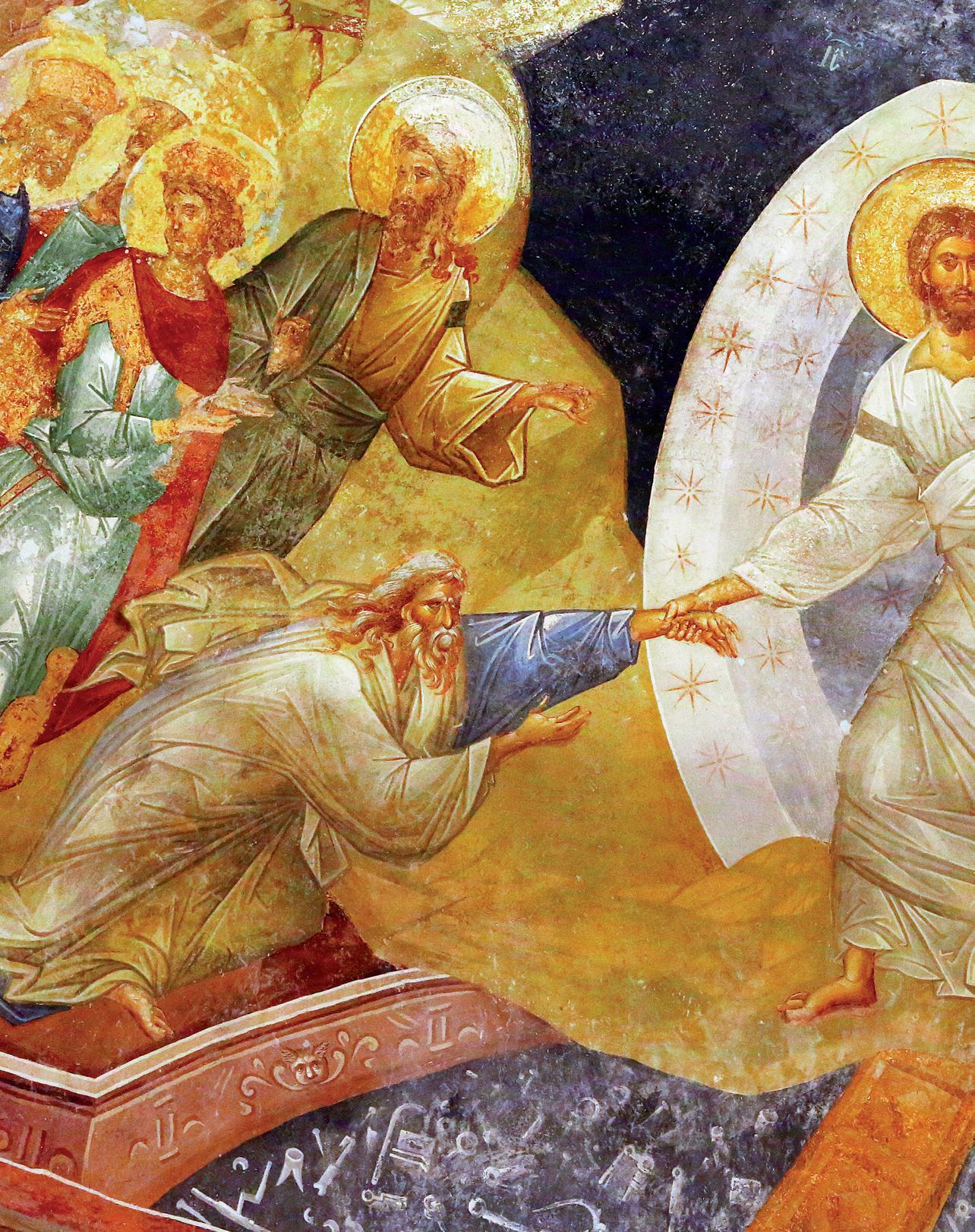
incorruption, and this mortal has put on immortality, then shall be brought to pass the saying that is written: “Death is swallowed up in victory.” 55 “O Death, where is your sting? O Hades, where is your victory?” And this itself shows that Jesus again fulfilled the prophecy from Hosea 13, from which St. Paul is quoting: “I am the Lord your God … I brought you up from the land of Egypt, and you shall know no God but Me; and there is no Savior besides Me. I tended you as a Shepherd in the wilderness … I will deliver them out of the hand of Hades and will redeem them from death. Where is your penalty, O death? O Hades, where is your sting?”
I must also mention what we have been singing at every Vesper Service, from Psalm 140/141:6-7: “They shall hear my words, for they are sweet; as when the thickness of the earth is broken upon the ground, their bones are scattered by the side of hell.” Correctly, it should say: “their bones are

scattered by the side of Hades, or Sheol, or as it says in some translations, at the mouth of the grave, but certainly not eternal hell.
Many of the hymns from the Pentecostarion are also quite clear about this, one of which says: “Descending with Thy soul into the nethermost parts of Hades, Thou valiantly leddest out all the prisoners whom death, the bitter tyrant, held from the beginning of time, as they cried unto Thee, O Christ God: Glory be to Thy dread dispensation” (HTM, Ode 7, Sunday of the Samaritan woman).
As you can see, this is not simply a change from one word or name to another, but rather, it most surely reflects our theology and teaching about where Jesus went when He died, and what He was doing there. He went to the realm of the dead, to Hades or Sheol, because that’s where all human beings go after their earthly life has ended, where they are all awaiting the final judgement in the end, which would then be either heaven or hell.
So, I believe that now, with this understanding and insight, our music should reflect all that has been said here, even if we have been singing this music for over 45 years. Our music is the means by which we pray, and therefore, our prayer should reflect our true belief, understanding, and proclamation of the Orthodox Faith.
Jesus destroyed Hades with His godly power; He cut through the all-ravening belly of Hades and snatched Lazarus clean out by His mighty power; He took Hades captive, and it was Hades that was embittered when it tasted of His flesh! And when He died, He was numbered among the dead, yet He was destroying the power of death, raising up Adam and releasing all men from Hades, the realm of the dead! For now, then, let’s leave hell to the days of the final judgment at the end of time!
ANDERSON, George, to the holy diaconate by Bishop THOMAS on August 18, 2024, at the Church of St. Mary, Chambersburg, Pennsylvania. Deacon George is assigned to the parish.
DOLMAN, Steven, to the holy diaconate by Bishop ANTHONY on June 29, 2024, during the Midwest Diocese Parish Life Conference. Deacon Steven is attached to Holy Transfiguration Church, Warrenville, Illinois.
FINZEL, Deacon Jeremy, to the holy priesthood by Metropolitan SABA on August 25, 2024, at St. Nicholas Church, Grand Rapids, Michigan.
HANNA, Deacon Raphael, to the holy priesthood by Metropolitan SABA on Sunday, September 22, 2024, at Virgin Mary Church, Yonkers, New York. He was assigned to St. George Church in Phoenix, Arizona, effective October 1.
SULTANI, Deacon Mark, to the holy priesthood by Metropolitan SABA on Sunday, August 18, 2024, at the Basilica of St. Mary, Livonia, Michigan.
SCHAPLOWSKI,Archpriest Michael, into the Antiochian Orthodox Archdiocese from the Orthodox Church in America, effective September 9, 2024.
Metropolitan SABA appointed Fr. Gabriel Karam as the Vice Chairman of the Department of Missions and Evangelism.
CHOUEIRI, Fr. Dimitri, as Pastor of St. Philip the Apostle Church, Edmonton, California, effective October 1, 2024.
KOURI, Fr. Jason, as Pastor of St. Ignatius of Antioch, St. Catharines, Ontario, effective September 1, 2024.
NASRALLAH, Fr. Nicholas, as Interim Pastor of St. Mary, Murrieta, California, effective September 1, 2024.
HODGE, Fr. Paul, to the Orthodox Church in America, effective September 9, 2024.
BLACK, Khouria Joyce Elaine,
fell asleep in the Lord on September 17, 2024. She was the wife of the late Very Reverend Boniface H. Black, her loving husband of 56 years. Born March 18, 1935, in Golden, Illinois, she was a daughter of the late Benhard and Esther (Reuschel) Buss. She attended Augustana College, earning her bachelor of arts degree in music. She then taught music in Guttenberg, Iowa, for several years.
Kh. Joyce’s love of music became evident at a very young age. She began to play the organ for church services at 13. Church music became a primary focus, and remained so throughout her life. Her involvement in church music continued over many decades – first in the Lutheran church, and then in the Orthodox Church. Singing and choir-directing brought her great joy. Joyce was instrumental in building and shaping the acapella Byzantine music program in the Antiochian Orthodox Christian Archdiocese of North America. She was recognized for her contributions and awarded the Antonian Medal by Metropolitan PHILIP. Many of Joyce’s beautiful music
settings are still in use today in Orthodox churches across America, including in the Archdiocese’s Sacred Music Library. In addition to her work in church music, Joyce gave countless piano lessons to many young musicians for nearly 60 years. Khouria Joyce, along with her husband, Father Boniface, served and worked in Lutheran churches in Iowa and Pennsylvania before entering Orthodoxy in 1978. They were a team in every sense of the word, working together to help establish three mission churches over the next several decades. They were founding members of St. Philip Church in Souderton, Pennsylvania, where Joyce served as choir director from 1978 to 2009.
Boniface, were also founding members of St. Andrew Church in Lewes, Delaware, where she served as choir director from 2009 to 2019. In addition, they both worked during this time to help grow another mission church on the eastern shore of Maryland. Joyce was a life-member of The Order of St. Ignatius of Antioch. Joyce is survived by her children, Jonathan Black of Perkiomenville, Pennsylvania, and Anna Mary Vogt (Jon) of Yorktown, Virginia.
Apply Now for a Grant from the Charitable Outreach Committee
Parishes and organizations across the Antiochian Archdiocese already in kitchens, feed
the homeless, serve women in crisis pregnancies, and so much more.
The grant program of the Antiochian Archdiocese’s Charitable Outreach Committee provides funds for these grassroots groups to establish, strengthen, and expand outreach efforts in their communities. Funding is available year-round.
Grant awards could cover expenses for well-established charitable programs, new charitable initiatives and the legal fees to form them, as well as emergency funding.
Completed application forms, available on the Archdiocese website, can be submitted to Anne Thomas, chairwoman of the Charitable Outreach Committee, at athomas@antiochian.org.
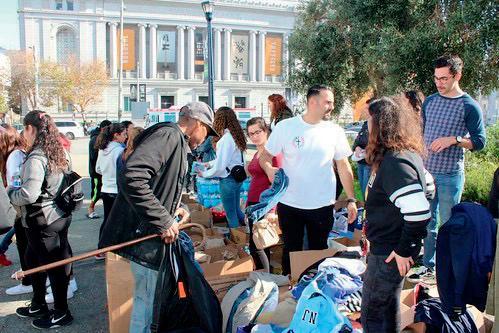
Deacon Habeeb Nacol

For almost seventy years, Psalm 130 has been my constant companion. I unwittingly learned and memorized it. Unwittingly is not a word that is associated with biblical and theological study or knowledge. One must deliberately read, learn, comprehend, digest, and apply the word of God and its divine message. I must confess now that I never read nor studied the scriptures until my mid-fifties. It was then that I earnestly began to explore the Bible as I was taking the St. Stephen Course. Nevertheless, I already knew very well this psalm of King David, and its verses were permanently etched in the crevices of my mind. Much later on, just like the “Jesus Prayer,” Psalm 130 crept into my soul and became a permanent and regular part of my daily prayers. But why and how did this happen? And, of all the great psalms that David wrote, why this one?
I grew up in a small town in Lebanon, a stone’s throw from our ancient St. Elias Patriarchal Monastery,
which is a scenic and short hike from our former Metropolitan PHILLIP’s birthplace. My home was in the mountains, approximately four thousand feet above the Mediterranean. Consequently, during the winter months, we usually endured several snow storms and the temperature could turn bitterly cold.
During the 1950s, when I was but seven or eight years old, a terrible tragedy hit my family. My mamma’s only brother, Uncle Sulaiman, who lived with my grandmother and took care of her, passed away at the age of thirty-nine. Afterward, my grandmother came to live with us. My grandmother, Teta Melia, was a frail, thin, and wiry woman with piercing black eyes. She had a strong will, a phenomenally sharp mind, and was very articulate. She was spiritual, but I never saw her go to church, which was around the corner from our house.
Because Teta was in her seventies, during the cold winters, she had a hard time staying warm. We only
had one heater in our house, which was located in what we called the “winter room.” When the weather was icy, my mother would often ask me to sleep in my Teta’s bedroom, in her bed with my head at its foot. In this way, she could put her feet on me, and I became like a heated brick to keep her warm. I actually loved doing this because my grandmother would often regale me with wonderful family stories about the old days and the hard times that she and her family had endured under Ottoman rule and during the Great War. My grandfather, like many able-bodied Christian men, was forcibly conscripted by the Ottomans in 1916. His abduction was part of a grand Turkish war plan that was known as “Safar Barlek.” Teta was left alone with three young children, and she never heard from her husband again.
Invariably, every night, just before she would fall asleep, I would hear my grandmother softly whispering in Arabic the same prayer. At that time, I thought it was her own made-up personal intercessory prayer that she had composed for her deceased, beloved son. Her prayer in Arabic always ended with “and He will deliver [Sulaiman] from all his iniquities.”
To make this story short, in 1961, at the age of thirteen, I immigrated to Port Arthur, Texas. In the early nineties, I moved to Beaumont, Texas, and started attending St. Michael Orthodox Church. One Saturday evening, after work, I decided to go to vespers, something that I had never done before. It being my first time, I was paying particularly close attention to this marvelously serene service and its beautiful hymns. As the chanters began to sing the “O Lord,” some of its verses seemed very familiar to me. It was as if I had heard them many times before, but when and where? At this time, I did not make the connection, possibly because the verses were chanted in English and were scattered and separated by short
readings. However, the familiarity engaged me and kept me wondering. I kept thinking about them, until one evening shortly thereafter, when I was lying in my bed, and just before I fell asleep the connection came to me. These verses were exactly the words that my grandmother prayed every night, except for that final verse. It did not state that Sulaiman was “delivered from all his iniquities.” Instead, it was “Israel” who was to be delivered!
One question that lingered in my mind was, How did my grandmother learn this wonderful psalm? I never saw her read the Bible! After much thought, the best that I could surmise was that my Teta was taught these biblical words by American Protestant Evangelical missionaries. In the 1850s, they had built a large prep school and retreat center near Teta’s house. I actually studied there before I immigrated. I learned much later that Protestants were diligent in the study of Scripture and often gave away Bibles free! They even gave my grandmother a pocket-sized one. I know that because my Aunt Salimi, her eldest daughter and my godmother, brought this Bible to America when she immigrated to Brooklyn in 1925. She gave it to me when I graduated from high school. I know this was my Teta’s because it had a message to my aunt on its first page in her distinctly beautiful handwriting. My grandmother often spoke kindly of the “Ameriken.” Apparently, she had become friends with many of the Americans despite the fact that she spoke no English.
It did not take me long to learn that Teta’s prayer was actually David’s Psalm 130. Because of all the memories it held for me, like my Teta, this psalm became very special. It became my regular private evening prayer and, later on, the object of some of my biblical studies. Just like my grandmother used to do, I began to substitute “Israel” with the names of my family
members who were far away in Lebanon, and/or any person that needed my prayers. In my old age, I often interject the names of my children and grandchildren.
Although Psalm 130 can stand alone in its beauty, searching for its deeper message became a theological project for me. It was like studying a poem, gleaning the true meaning and symbolism from its words. Gradually, I thrived in discovering the hidden meaning within this prayer. More significantly, I began to find the theological message that it, like all Scripture, embodies. What was God telling me in its verses?
David’s intercessory Psalm 130 not only provides a healing balm, but also grounds for optimism, faith, reliance, hope, and trust in God. As Christians, we need these reminders in order to overcome the doubts, troubles, and despairs of trying times. This psalm’s array of themes presents many gifts, assuring us that ultimately things will turn around, we will overcome, and it will be well with us.
The brevity, beauty, and simplicity of Psalm 130 belie the highly significant theological messages that it offers. In the first verse of David’s prayer, he cries out to God from his “depth.” That depth signals the gravity of David’s despair. This is no ordinary conversation with God, but a serious and anguished plea, a cry. In a previous Psalm, 42:7, David wrote “Deep calls to deep at the thunder of thy cataracts; all thy waves and thy billows have gone over me.” David is separating himself from all mundane distractions by “laying aside all earthly cares” (Divine Liturgy). He does this to focus and reach his own depth, as well as the depth of his ineffable God. It is in this human dimension, in the nous, that the bare truth and holiness are found. There is no pride, deceit, grandstanding, or hypocrisy in the nous. In the holy depth of the silence of the heart lies pure veracity,
earnestness, perception, understanding and, above all, holiness and utter faith in God and in His mercy. It is from the confines of that depth, as the psalmist tells us, God’s “ears may be attentive to the voice of [our] supplication.” It is in this heart-to-heart holy synergy that God will certainly hear us, and we can best receive His comforting answers.
In the Gospel of Mark, Jesus says, “No one is good but God alone” (Mark 10:8). Yet God also tells us in Genesis that all his creations, including man, were not just good, but “very good” (Genesis 1:31). In this psalm, David alludes to Adam’s fallen and corrupt nature as is written in the Torah. We humans became subjects to sinfulness and its terrible consequences. All humans have “gone astray, they are all alike corrupt” (Psalm 14:3). In this sinfulness, David, in our psalm, inquires of the Lord, “O Lord, who shall stand?” His all-important questions to God are, Are we all destined to remain mired in our self-inflicted destructive iniquities? Will no one be justified? Is this to remain our hopeless destiny? This psalm, however, is not about dejection and despair. It is one of hope, founded on divine mercy. David had the assurance, or better yet, the certainty that “with the Lord there is mercy and abundant redemption.” He, the prophet, is certain that salvation will come, but how and when?
David now pivots toward his optimistic prophecy. He prays that, because of God’s eternal name, he will wait patiently for the promised salvation. David continues, “My soul hath waited upon Thy Word.” For us, who believe in Christ and His dispensation, this phrase is the key to understanding the entire psalm. With utter confidence, he waits upon the Word. To wait is confidently to expect.
Empowered with his new confidence, the psalmist continues, “My soul hath hoped in the Lord!”
He patiently awaits the coming of the promised Messiah “from the morning watch until night.” He does not allow his soul to slumber. He continuously holds a trustful vigil, anticipating the coming of the Word, the “Bridegroom” (Matthew 25:1–15). David concludes his psalm on a high note, full of hope and assurance. He prophesies that the Lord will come, and “He will deliver Israel from all his iniquities.” Unlike the word shall, his use of will is definitive. He will act, and He will certainly break the bonds of sin. He will restore and free His Israel from the chains of his iniquities.
From the perspective of the New Covenant, we know that the Word hears David’s cry. He answers him, for the prophecy of Psalm 130 is fulfilled. The awaited Word of God comes and dwells among us (John 1). He is indeed the Son of God. We receive
the Word, who in the beginning created all. It is in the Word, and only by His power and majesty, that we are delivered. In Him, we who believe, stand! We do not fall! We stand because of His love, mercy and “abundant redemption!” He shows us, who are now His Israel, the way to the reopened Paradise. Once again, He is our accessible God, and we are His people (Jeremiah 24:7, 31). He dwells with us and in us; He wipes away all our tears and brings us back to our original pristine beauty. As promised, He once again makes “all things new” (Revelation 21:5).
My Grandmother left me with many memories, that to some extent shaped who I am today. But her most enduring legacy was bestowing on me a strong faith, hope, and reliance upon the Lord and His promise of redemption, which are all embodied in her prayer – Psalm130.
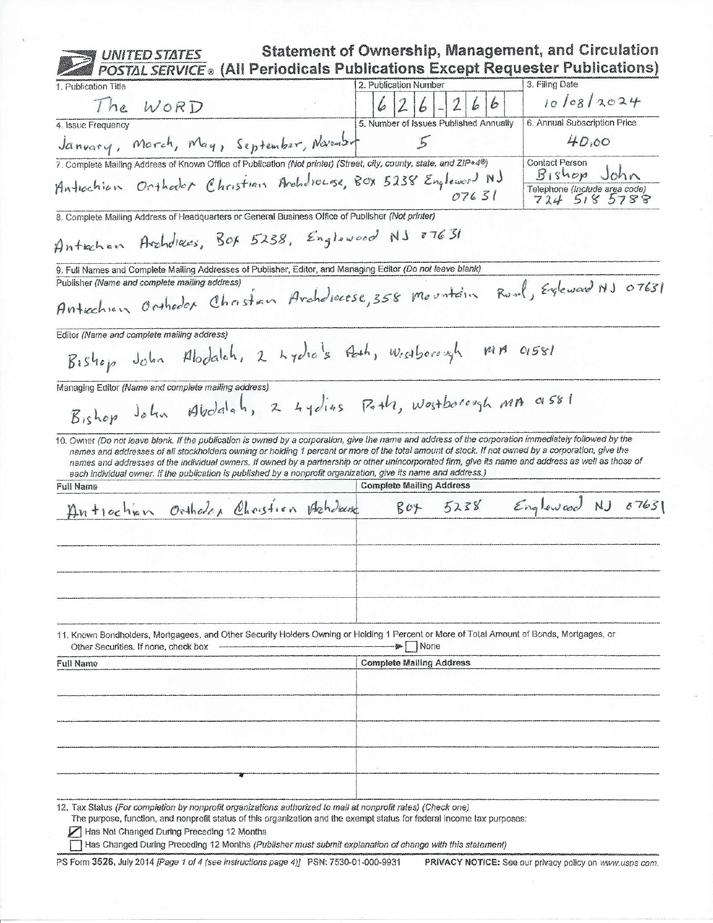

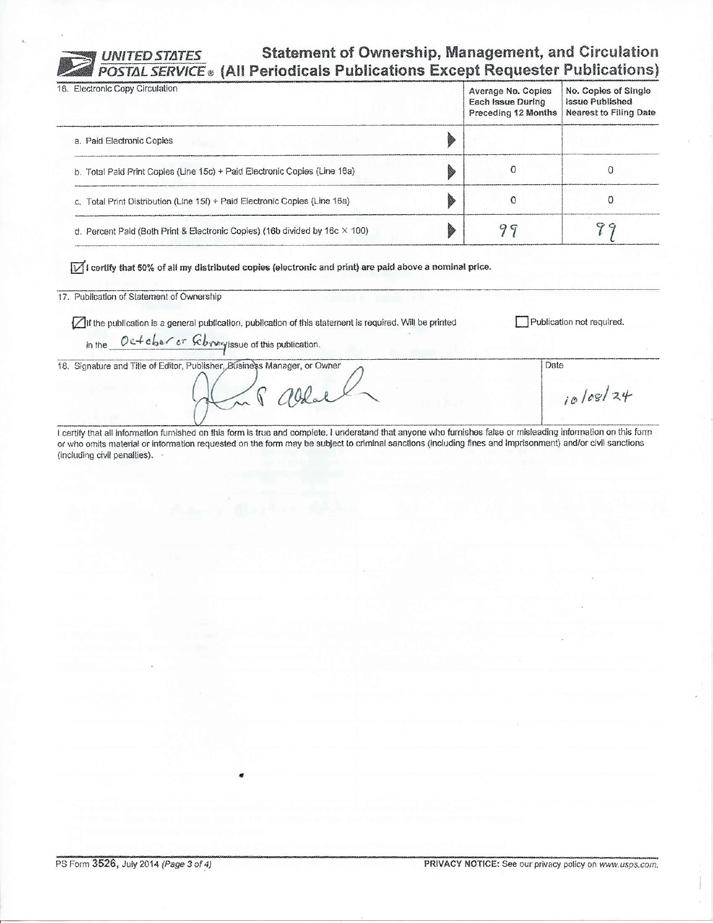
Eli Hajjar, from the Diocese of Los Angeles and the West
Throughout our lives we are constantly worrying about the future. It doesn’t matter where we are in life; it just seems like there is always something to stress about. Whether it is about careers, relationships, health, or finances, the list goes on. I was even worried about coming up here in front of you today. Ultimately, we spend hours agonizing over possible outcomes, playing out scenarios in our mind while we lose countless hours of sleep.
Think about it: How often have you been lying awake at night, consumed by thoughts of what may happen tomorrow? Maybe it’s the fear of failure that keeps you up, or the uncertainty of what the future holds for you and those you love. Perhaps it is the pressure to succeed in such a competitive world. Whatever the source, our worries always lead to anxiety, stress, and a sense of helplessness.
But what happens when those things we worried about take a turn for the worse? What if our worst

fears come true? We may feel confused, questioning why something did not go our way. Many of us will ask, “Why me?” or “Why is my life so horrible?” I for one have said that one quite a lot. We quickly become frustrated with ourselves, maybe for not doing enough to maintain that relationship, to get into the college of our dreams, or to get that job we always wanted. Some of us grow angry with the world because of circumstances we could not control. “Why do bad things always happen to me?” you ask. Yet what if I told you that that was not the case? What if I told you that what we see as “bad” is influenced by our human desires. The truth is, we are so used to getting what we want, that when we do not, we only see the worst in that situation.
What if, instead of viewing those experiences negatively, we saw them another way? What if we simply trusted that they are a part of a bigger plan for our lives, God’s plan?
Often, when something seemingly bad happens in our lives, we question God as well. Before coming here, I was at Antiochian village for the first time in years. To be honest, I did not want to go. I was worried that I might not fit in, being away for so long. I struggled with the idea of not having control over my daily life. I questioned if I would feel God’s presence there the same way as before, but now I can say that going back to camp was the best thing I could have done. I met people that I now call my brothers. I learned so much from others and their experiences of life. Most importantly, I grew closer to God during such a crucial time in my life. Many of us often question God’s plan for us, because at times we go through something that doesn’t go our way. Yet that’s exactly it: our way. We forget that God has a plan for us, one that may not align with what we want at a given moment. Though at first I did not want to go to camp, I realized how much it helped me to grow as a person, and as an Orthodox Christian. Although at first I worried that it wouldn’t be a good experience, it really was. All along, it was aligning me with God’s plan, which is now clear to me.
Everything goes according to His plan, and we cannot stand in the way of that. So, when these “bad” things happen to us, are they not just part of His plan? Are they not just a lesson, are they not just the opening to a new path, our intended path? So how can they really be bad? Can we not say those events were just not meant to be? Are they not just for the best?
I admit, it is difficult at times to trust that His plan for us is better than anything we want. It is so hard to let go of our own desires, what we think is good for us. Proverbs 3:5–6, however, tells us to “trust in the Lord with all your heart, and do not rely on your own insight. In all your ways acknowledge Him, and He will make straight your paths.” We have to believe that God knows what’s best for us, that when one door closes,
another opens, that everything finally goes according to His plan. It is all about trust. So how can we hand over the reins, as it is so difficult to forget about our earthly desires? Trusting God is simple; it really is. One of my favorite sayings goes like this: we relax in a bus when we don’t know the driver, we relax in a plane when we don’t know the pilot, so why not relax in life, knowing that God is in control? Brothers and sisters, as much as we complicate our lives, trusting God should be easy, it should be comforting. Through all the chaos in our lives, God is a calming presence, telling us that He already has everything figured out. He is always leading us along His path for us, even though we may not be able to see it. As St. Paul says in Romans 8:28, “And we know that all things work together for good to those who love God, to those who are the called according to His purpose.” By loving God, we will never be in despair, as He never forsakes us. He stands with us, leading us towards the good.
So, going back to the question, “How can we trust God?” I think the real question is this: “How can we not trust God?” When everything in our lives seems so stressful, so full of pain, He is there, carrying us forward. Through every closed door, through every loss, through every failure, He continues to lead us on our path and nothing will ever get in the way of that. In the end, it is about reaching our purpose, which we will all do by trusting Him. And so all things will come together for good, even those things that seemed so bad. God sees the bigger picture, and He will make sure everything works out in the end, according to His plan.
Still, I know putting all our trust in God isn’t easy. I struggle with it now, as I will struggle with it for the rest of my life. The truth is trusting Him will never be easy because of human nature. We will always feel the urge to worry about almost everything. And we will
always want to question why something we wanted more than anything didn’t happen for us. Still, if we can accept that God is in control, putting all our trust in Him, our burdens will become light. Only then will we have true freedom, knowing that He will never leave us or forsake us, but will always be with us, guiding us along His path.
Brother and sisters, let’s surrender our worries and fears, knowing that God already has everything figured out. We are all going through something, and however awful it may seem, just trust God. I’ll leave you with a verse from Jeremiah: “Blessed is the man who trusts in the Lord, whose trust is the Lord. He is like a tree planted by water, that sends out its roots by the stream, and does not fear when heat comes, for its leaves remain green, and is not anxious in the year of drought, for it does not cease to bear fruit.”
During the weekend of December 15–17, 2023, St. Ignatius of Antioch Orthodox Christian Church in Twin Falls, Idaho, celebrated its 30th anniversary. His Grace Bishop Anthony graciously joined Fr. Michael and Khouria Maria Habib, clergy, parishioners, friends, and family members from local and surrounding communities for the celebration.
The parish warmly received Sayidna for Vespers on Friday night, which was followed by an encouraging talk from Sayidna and wonderful fellowship over dinner. “There’s a simmering arrogance in our world that wants to take on the role of God and rely on science and technology to give us our meaning,” His Grace stated:
The American dream has changed from seeking virtue to seeking self …. The Church does not believe in the progressiveness of society that comes via science and technology. We believe this life will end. We believe in the Kingdom. Historical progress is not the answer; the mystical progress – process – of growing into the likeness of Christ is the life we follow …. All of us come here with different histories and they’re melted together into the history of the Church. We should love the time we’re in, and not wish we were in a different time. God knows better than we do.
Sayidna was also kind enough to meet with the parish’s growing young-adult group for a questionand-answer session, in which he imparted additional wisdom: “A mistake is something you did; it’s not who you are. If you sin, confess it, and move on. Leave it alone … . Christ has always been turned toward you. He’s just waiting for you to turn toward Him.”
Two parishioners, Brent (Theodore) Butler and Stephen Basaraba, were tonsured readers at Sunday’s Hierarchical Divine Liturgy. Finally, at the banquet that followed, several parishioners, including one of the parish’s ten current catechumens, shared their stories of coming to Orthodoxy and how they came to call St. Ignatius their home parish. May God grant St. Ignatius Orthodox Church – along with the other parishes of our great and growing Archdiocese – many, many years!
On Saturday, September 21, 2024,
St. Anthony Orthodox Church in Bergenfield, New Jersey was honored to have His Grace Bishop JOHN present the third annual Fr. Joseph Allen Memorial Lecture. The Father Joseph Allen Memorial Fund honors St. Anthony’s beloved pastor of 53 years, who departed this life in 2020. In addition to being a pastor, Fr. Joseph was an educator, author, and theologian. The fund supports the enrichment and expansion of Christian educational opportunities for the benefit of the parish and the broader Orthodox community.
Bishop JOHN spoke about Pastoral Care in the Orthodox Church, both from his own deep credentials in the field and from his unique perspective as Fr. Joseph’s student and selfdescribed mentee on the subject.
The evening, which began with vespers and a dinner reception, was a warm mix of teaching and storytelling. Bishop JOHN spoke about Fr. Joseph’s frequent reference to praxis as what brings us to salvation – it’s the doing. What we do, what we pray, who we love, who we serve and how we forgive each other is what allows us to participate in Christ’s ministry and life.
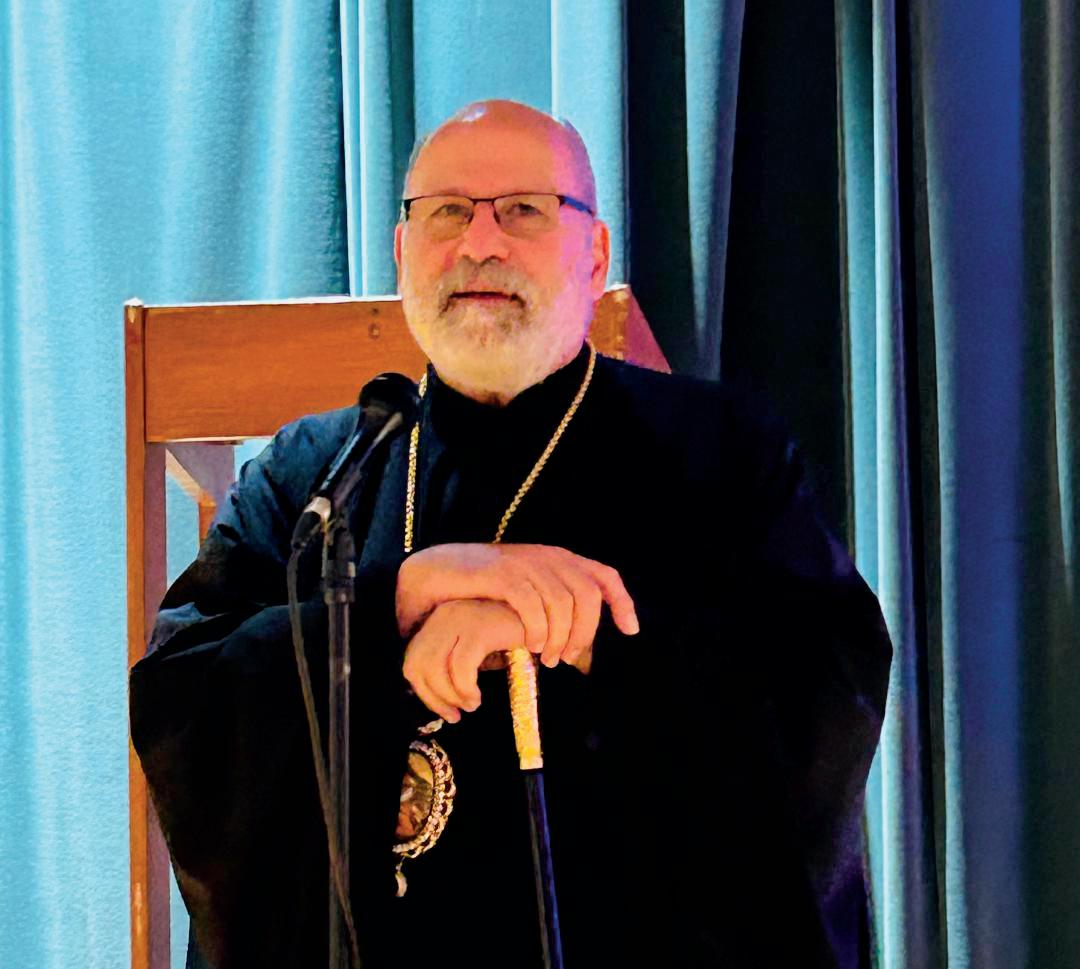
WHEN YOU ARE TRYING TO LEAD SOMEONE, THE PERSON YOU ARE TRYING TO LEAD HAS ALL THE POWER IN THE RELATIONSHIP.
He spoke about how, when we visit each other in the hospital, we don’t “take God” to the hospital – God is already there. We help people recognize that God is with them in the hospital and that God and His community care about them enough to come and sit with them and be with them. That is pastoral care. Pastors model it, but it is up to all of us to live it: it is what we are meant to do and be.
An important part of this care is allowing people to experience God’s presence through our presence. When someone is in the height of emotion, instead of telling them what to do, pray and be there for them. Problems can be resolved by considering what is appropriate, what is fair, what is right, and what is holy. Fr. Joseph taught people how to listen, to work with small groups, and to discover by asking questions, instead of simply telling people. Bishop JOHN reminded us, “When you are trying to lead someone, the person you are trying to lead has all the power in the relationship.” Pastoral care is offering God’s love, helping one another consider consequences, asking about probable results, and praying for each other.
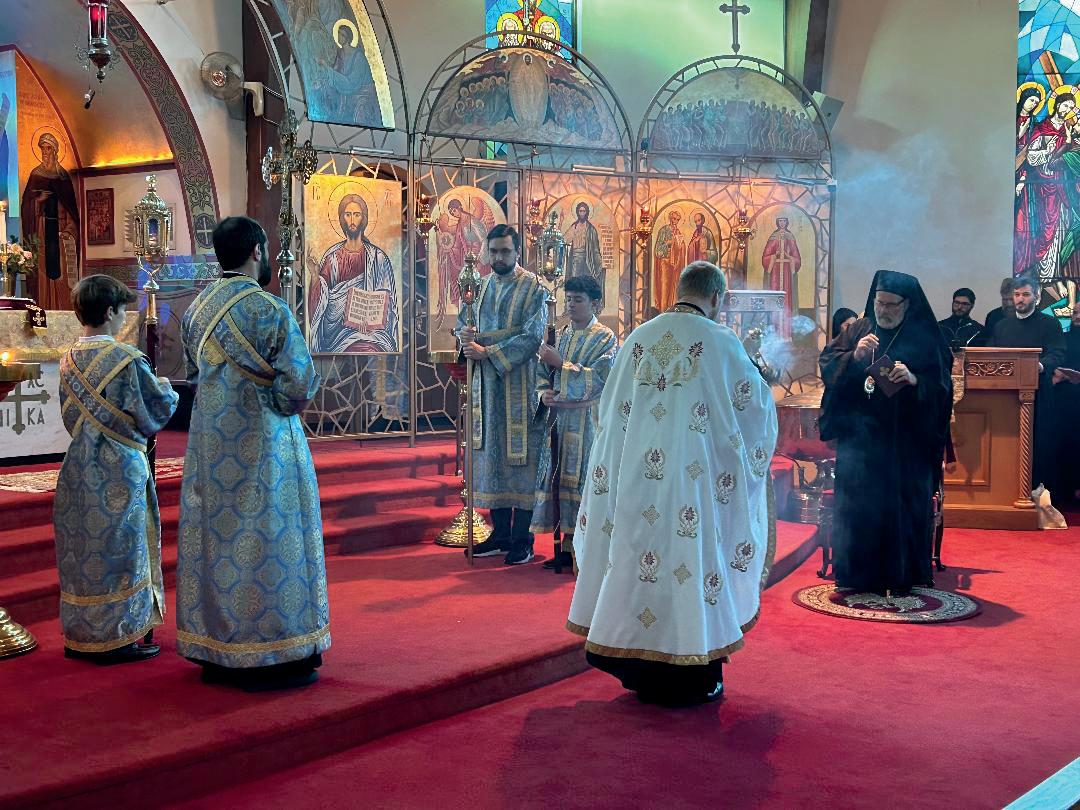
Bishop JOHN observed, “That way of thinking and the way of teaching was what Fr. Joe offered the English-speaking world. I understand that eighty percent of Fr. Joseph’s books are sold to nonOrthodox and all of the seminaries, Protestant and Roman, use his books.”
Bishop JOHN also shared a wonderful story about Mother Alexandra (the daughter of King Ferdinand of Romania and its last princess, who founded the Orthodox Monastery of the Transfiguration), who used to encourage people in conflict to personalize the line in the Lord’s Prayer from “forgive us our trespasses, as we forgive those who trespass against us,” to “forgive me my trespasses, as I forgive Shirley,” as a way of making clear that our request for forgiveness requires us to forgive.
It was a wonderful night, filled with love. In addition to the illuminating talk and delicious food, there was an extensive display of the parish’s history.
Thank you to His Grace for being our guest speaker and everyone who helped make this night happen!

Matushka Monica Olsen
Mariam kneeled over the baby’s blanket with her hands resting on her on legs, frowning. She wiped the sweat from her head, wishing they were back in the north instead of the oven-like Louisiana. She barely remembered New York, but she loved to hear the stories of life before their stagecoach and steamboat journey down here. Little Michael smiled and gurgled up at his sister. She smiled back weakly and bent over to smooth the stray hairs from his dark forehead. When she did, her cross hung down low enough for him to grab. She gently pried it from his tiny pudgy fingers, held it up to his lips, and urged him, “Kiss the cross, Michael. That’s right.” Then she rocked back onto her legs and sighed. Her grandmother, passing through, heard her sigh. “What’s wrong, my sweet one?” “O, Teta, I wish Michael had a cross of his own.” Teta sat down and patted the sofa next to her. Mariam couldn’t resist and crawled up, cozying her body next to her grandmother’s warm softness. She stared down at the oblivious baby, who had picked up a spoon and was waving it in the air
“He’s just a baby.” Teta’s husky voice was like cinnamon and cloves. “Besides, he can kiss yours.” “I

know. But you told me I got my cross when I was a baby.” “We lived in a big city when you were a baby. New York, New York! We had a Church there, so you were able to be baptized.” Her fingers ran softly through Mariam’s hair. “But that was ten years ago.” She pulled the little girl tighter to her. “We have no church in Louisiana.” “So we have to wait until we save enough money for five train tickets and hotel rooms, for poor Michael to be baptized.” She looked up at her grandmother. “That will take forever!”
Teta smiled at her. “Just you wait. Ask God for help, and He will take care of us.” The ring of the telephone vibrated from the kitchen, where Mother was making kibbe. The smell of the fried patties of meat and onions and wheat drifted into the living room. Miriam could hear her mom answer. “Hello, Khoury residence.” Pause. “Oh. Oh, dear. Master, bless! Yes! Yes, we are Orthodox Christians. Where did you say you were?” Pause. “I’ll send a message to
my husband at work and get him to pick you up at the train station, Syedna. Thank you!” Later than night, His Grace, Bishop Raphael of Brooklyn, walked through their front door. Miriam had never seen a Bishop before! She bowed low and kissed his hand before she looked up into his full brown beard and dark tan face. They led him to the living room and a real live Bishop sat down right on Mariam’s couch –right where she had been sitting earlier!
Mariam’s mother brought Bishop Raphael a tiny cup of strong coffee. “Syedna, we are so blessed for you to be in our home.” She offered him some sugar. “Thank you.” He took a sip and nodded his appreciation to her. “How did a bishop from New York end up all the way down here in Louisiana?” He finished the little coffee and set it on the side table, looking in the face of each new member of his Louisiana flock. “Well, I am originally from Damascus. I was serving the Church in Russia, when I was asked to come serve the Arabic folks in New York. I soon learned that we have Arabic Christians spread all over the United States. So, I booked passage on a train and started looking for them.”
Mother blinked her eyes and dropped down to the chair next to the couch. Mariam’s father spoke up. “But how could you know which cities to visit?” Bishop Raphael smiled with his whole face, even his eyes and eyebrows. “I booked the train from New York to Los Angeles. That trip takes several weeks, and the train stops at many stations. Whenever there’s a long enough layover, I get off and head to the red phone booth. I look in the book for that city and run my finger down the names until I find a Lebanese or Syrian name. Then I make the phone call.” He shrugged his shoulders as if that were a normal thing for a pastor to do. Teta’s eyes widened. “And you ended up here?” “Yes. I like to seek out my flock and see if there are any weddings to perform or any memorials
to serve or any babies…” Mariam gasped! “…to baptize.” Mariam and her mother and her father and her grandmother all looked at each other, energy building in their frozen postures. Mother burst up, then hesitated, biting her lower lip. “Well, actually…” Mariam popped up and didn’t stop bouncing as she yelled, “we have a baby!”
Bishop Raphael smiled at her through his bushy beard. “Then I guess we better prepare for a baptism tomorrow.” As Mariam lay in bed that night, she heard her mother on the phone, calling the other Lebanese families in town to invite them to the baptism. She heard the front door shut when her father walked out to talk to Mr. Broussard down the street. He owned a jewelry store and could sell them a cross. As Miriam listened to all the wonderful noises, whisps of white smoke drifted in from under her door. Her room began to smell like roses. Then she heard her favorite sound that night: the low chanting of the Bishop saying his evening prayers. The chanting washed over her as she fell asleep.
The next morning, after the baptism, Bishop Raphael talked for a long time with the Lebanese families of Louisiana. Then they all stood up and faced the icon corner and prayed that God might give them a church and a priest for their city. With hugs, and kisses, and exchanges of love, the pastor left his flock to go seek more lost sheep across the huge land of the United States. That afternoon, when Mariam sat on her knees with her hands resting on her lap, she looked down at the newly illumined Michael playing on his yellow blanket. She reached down and picked up his cross and held it to his lips so he could kiss it. Then she rocked back onto her legs and sang him a song.
In addition to writing fiction for her own children, Matushka Monica writes for Kosmeo Magazine, the St. Nicholas Navigator and for her blog, “Orthodox Mothers Digest.”
ALL SCRIPTURE IS GIVEN BY INSPIRATION OF GOD, AND IS PROFITABLE FOR DOCTRINE, FOR REPROOF, FOR CORRECTION, FOR INSTRUCTION IN RIGHTEOUSNESS, THAT THE MAN OF GOD MAY BE COMPLETE, THOROUGHLY EQUIPPED FOR EVERY GOOD WORK (2 TIMOTHY 3:16–17).
Orthodox Christian educators from as far as Alaska and from multiple jurisdictions came together at Antiochian Village Conference Center from June 6–9 for a conference hosted by the Christian Education Ministry. “Handing Down the Faith: Equipped for Every Good Work” – the Conference theme – was based on 2 Timothy 3:16–17. The goal was that, by the end of the Conference, each educator would be equipped to support the good work of the Christian education programs in their parishes. His Grace Bishop THOMAS of the Diocese of Oakland, Charleston, and the Mid-Atlantic presided over the event. He shared his profound knowledge of Christian education, while also engaging his listeners with humor.
The schedule of speakers and workshops provided ample opportunities for educators to participate in formative and restorative sessions for the benefit of their own spiritual lives and their Christian Education ministries. Touring the Heritage Museum and connecting with God’s creation on the Meditation Trail at the Village provided additional opportunities for reflection.
Fr. Nicholas Long (St. Elias Church, Austin, Texas) presented the first evening lecture, “Inheriting Scripture: The Apostolic Application of the Christological Hermeneutic and Its Continuation in the Life of the Church.” Educators were guided through the historical, allegorical, anagogical, and tropological nature of Scripture in a rich discussion.The evening concluded with an exciting and competitive game of “Who’s the Apostle?” generously provided by the curriculum publisher Orthodox Journeys.
On Friday morning, the Diocese of Toledo and the Midwest’s Christian Education Coordinator Robert Snyder presented a hands-on, practical workshop for parents called “Back to the Future: Developing Skills for Parenting by Example,” that was focused on modeling the Faith from an Orthodox Christian perspective. Also on Friday morning, author and speaker Summer Kinard set up a full-size, accessible classroom for the interactive workshop, “Faith that Sticks: Classrooms that Nurture LongTerm Learning.” Following the morning sessions, Christian Education Coordinator Mireille Maalouf of the Diocese of Ottawa, Eastern Canada, and Upstate New York, and the Archdiocese’s Christian
Education Director of Training and Development, Sandy Nelson, co-led a discussion with Sunday church school directors and teachers on the future training materials being developed by the Christian Education Ministry.
Later that afternoon, Christian Education Theological Advisor Fr. Stephen De Young (Archangel Gabriel Church, Lafayette, Louisiana) walked the group through fascinating chapter-bychapter outlines of the Gospel of Luke and The Acts of the Apostles. This was in preparation for the forthcoming 2024–2025 church school curriculum that has been developed by Christian Education and is based on these books. The final session of the day was a Q & A on moral issues. The panel included Bishop THOMAS, Archimandrite Maximos Constas, Archpriest George Alberts (St. Mary Church, Wilkes-Barre, Pennsylvania), Archpriest Stephen De Young, and Fr. Nicholas Long. It was moderated by Youth and Young Adult Ministries Chair Archpriest Nicholas Belcher. Drawing from their years of experience, each clergyman shared unique, insightful answers to audience questions.
That evening following Vespers and dinner, keynote speaker Archimandrite Maximos Constas (Distinguished Professor of the Humanities at the University of Austin) presented “Learning to Unlearn: Foundations of Orthodox Education,” weaving in wisdom from the writings of the Fathers. He quoted St. Basil of Caesarea: “We must be ready to receive divine instruction, we must prepare the heart by unlearning (ἀπομάθησις) the teachings that have come to possess it, for it is no more possible to write in wax without first smoothing away the letters previously written on it, than it is to provide the soul with divine teachings without first removing its preconceptions derived from habit.” Fr. Maximos
emphasized that educators must – among other things – love and live what we teach. We must love those whom we teach in imitation of Christ, and live and embody the truths we teach.
Saturday morning provided an opportunity for another set of edifying workshops. Fr. Nicholas Long led educators through a session of personal reflection and spiritual instruction during the workshop, “The Life of the Teacher: The Importance of Our Own Spiritual Life and How It Affects Us in the Classroom.” Diocese of Wichita and Mid-America Christian Education Co-coordinator Khouria Gigi Shadid led a lively workshop filled with Orthodox Christian children’s music and classroom games: “Teaching Children: A Hands-On and Musical Approach.”
By the gravesite of St. Raphael of Brooklyn at Antiochian Village, Robert Snyder vividly recounted
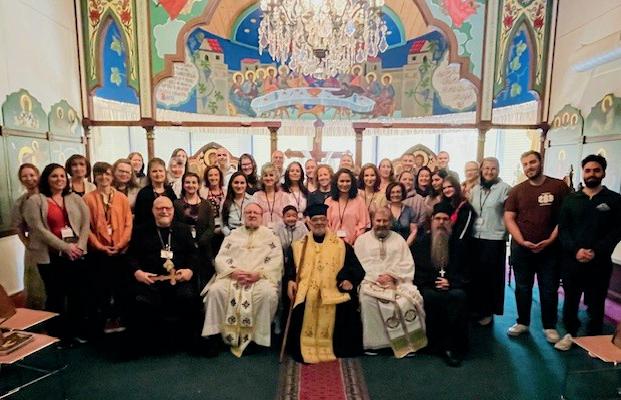
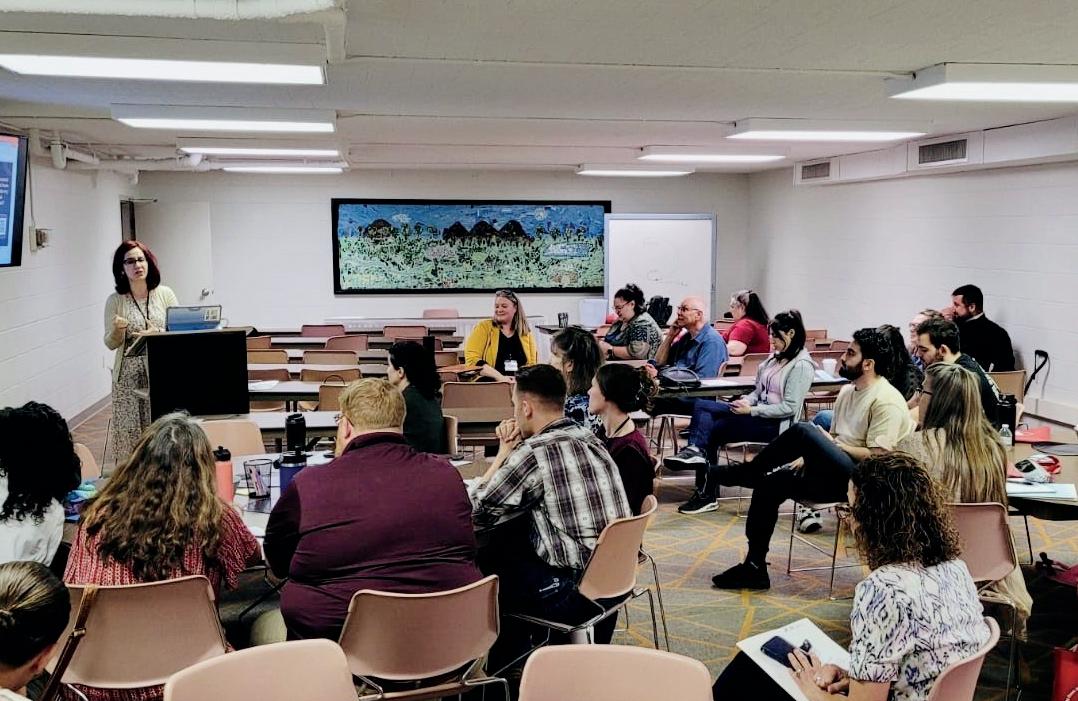
details from the Saint’s life, followed by Fr. George Alberts leading a service of supplication. The gentle breeze carried the prayers and hymns across the rolling hills of the campground. Later that afternoon, Fr. Chris Shadid and the rest of the Antiochian Village Camp staff warmly invited educators to observe a camp counselor training session in order to gain ideas which could be implemented in their classrooms.
On the final evening of the Conference, Fr. Maximos Constas spoke to the group again, this time about “Spiritual Formation and Liturgy: The Sundays of the Pentecostarion.” As with the evening before, Fr. Maximos wove powerful imagery, Holy Scripture, and words from the Fathers throughout the lecture, while guiding the audience in understanding the symbolism of water during the Pentecostarion period.
He closed with this quote from his patron saint, Maximos the Confessor. “Jacob’s Well is Scripture. The water is the knowledge that Scripture contains. The depth of the Well is the meaning of the biblical enigmas, which are all but beyond one’s reach. The ‘bucket’ used for drawing out the water is learning about the Divine Word acquired through written letters, which the Lord did not require, since He is the Word Himself and He does not give this knowledge to the faithful through learning and study, but to those who are worthy He grants a measure of the ever-flowing wisdom of spiritual grace.”
Later that evening, educators enjoyed a book signing and an elegant reception sponsored by the Antiochian Village Bookstore and Giftshop, featuring acclaimed authors Fr. Maximos Constas, Fr. Stephen De Young, and Summer Kinard.
The Hierarchical Divine Liturgy was celebrated alongside camp staff and counselors Sunday morning in the St. Ignatius Chapel at the Village. Several
educators shared how moving it was to be a teacher of youth surrounded by youth joyously participating in the liturgy. Following the liturgy, Director of Christian Education Ministry Anna-Sarah Farha presented the Synaxis of Antiochian Village Saints icon to Bishop THOMAS in appreciation of his tremendous support for the conference.
Attendees offered encouraging feedback at the conclusion of the Conference:
THANK YOU FOR A CONFERENCE THAT WAS CHOCK-FULL OF PRACTICAL INSPIRATION
“I want to thank you for organizing this. This was a great success. I really needed to meet with others, establish these connections, and get this training. I feel much more connected and supported than I did before.”
“I just wish there could have been more of the whole conference. Obviously time constraints are present, but the entire time there was so wonderful that I wish I could have stayed longer.”
The next Christian Education conference will take place in 2026, and enthusiasm is already building. View the conference photo album at https://www. flickr.com/photos/antiochianarchdiocese/albums/ for more pictures from the events.
Follow Antiochian Orthodox Christian Education Ministry on Facebook for news and updates.


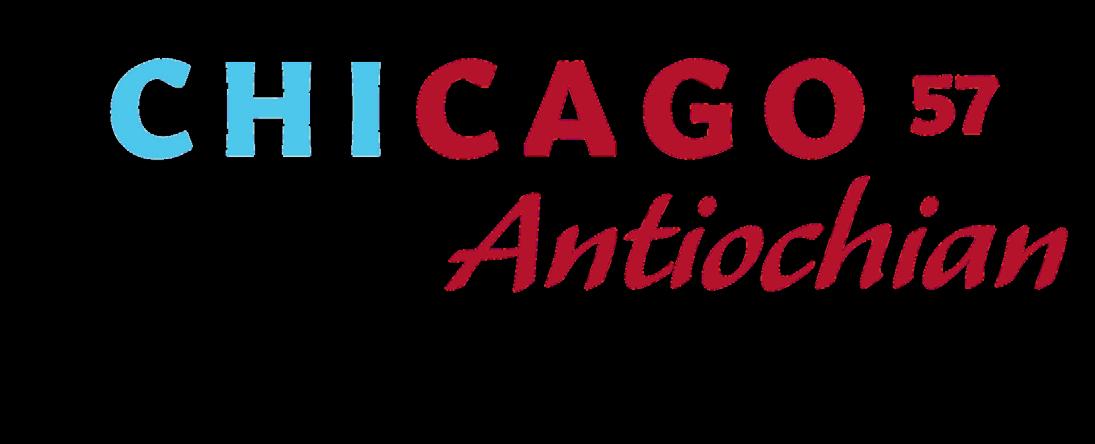






“CONTINUING THE ANTIOCHIAN LEGACY IN CHICAGO”

50TH ANNIVERSARY OF THE UNIFICATION OF NEW YORK AND TOLEDO and the 120TH ANNIVERSARY OF THE WORD MAGAZINE
Church Services
100+ Events and Meetings
Club Saint George for ages 4-12
Teen Events
Young Adult Events
Humanitarian Activity Workshops
Bible Bowl

Oratorical Festival
“Taste of Chicago”
Antiochian Legacy Banquet and Grand Hafli
“Ask Abouna” all week
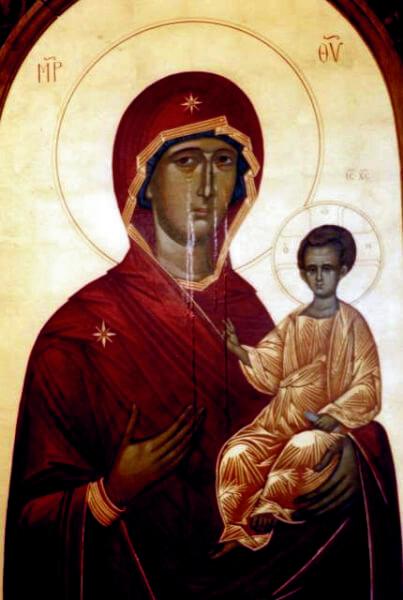






“Then Mary said, ”Behold the maidservant of the Lord! Let it be to me according to your word.” And the angel departed from her.” Luke 1:38